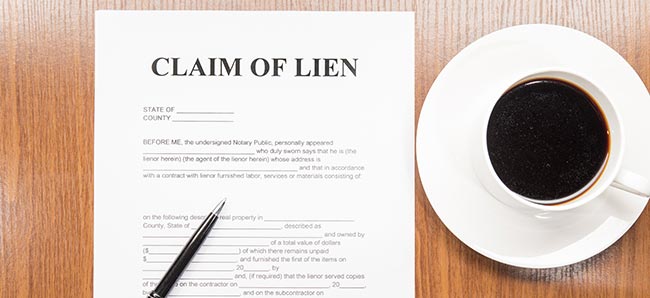Attorney Joesph Turner talks about why completing the lien process correctly is so important.
Contract and payment disputes between contractors and homebuyers are very common. In some situations, the homebuyer runs out of money at some point during the construction of a house and is unable to pay what they owe to the builders. Other times, the workmanship is poor and the homebuyer refuses to keep paying until mistakes are fixed. Whatever the reason, contractors will often find themselves in a position where they have done a good amount of work but are not being paid for it.
Liens are one of the most common tools a contractor can use to ensure he or she obtains payment from a reluctant client. By filing a lien, the house (or other property) becomes encumbered, which prevents sale of the property, and will become a sticking point for a title company if the homebuyer is trying to close on his or her mortgage. As a result, a homebuyer may find that he or she has no choice but to pay off what the contractor says is owed so the lien can be removed.
If you build houses, liens may appear like a fool-proof system to ensure you are paid. Liens are relatively easy and cheap to file and will generally stop a non-paying customer in his or her tracks. However, it is important to proceed with caution before filing a lien. Unfortunately, the lien filing system has been exploited by unscrupulous builders and mechanics who have used liens to extort money from customers who do not actually owe anything. In these situations, customers, caught in the middle of closing their mortgage, selling their house, or attempting to take out a loan, discovered they would need to pay something they didn’t owe simply to have the lien on their home or car removed. In order to protect these customers from fraudulent lien filers, the New Mexico legislature enacted a law called the Lien Protection Efficiency Act on July 1, 1999.
The Lien Protection Efficiency Act or the “LPEA” imposes severe damages and fines on persons who file invalid or fraudulent liens. The LPEA allows persons who have a lien on their property to file a lawsuit to determine whether the filed lien was properly filed. Once this is done, the person or entity who filed the lien will be forced to go to Court and prove that the lien is valid. If that person or entity doesn’t go to court or prove the lien is valid, they can be subject to damages including paying all of the customer’s attorney fees and costs associated with bringing the lawsuit, as well as their actual damages or five-thousand dollars ($5,000), whichever is greater.
The LPEA means that if you file a lien without evidence to support the amounts you claim you are owed, there’s a risk that the customer can come after you for any damages they suffered as a result of the lien, as well as all of their attorney’s fees and costs. Even if the customer did not suffer any actual damages, the LPEA will ensure they are paid at least five-thousand dollars ($5,000) for his or her troubles. To prevent this, it is very important to ensure you maintain any documentation you have to support the amounts you were owed. Invoices, receipts, logged hours, and written communications with your customers can all help you to safeguard yourself before you file a lien.
Ultimately, filing a lien can be very easy, but it can cost you a great deal if you fail to do it accurately with supporting documentation. An attorney with experience in this field can help guide you through this process and ensure you and your business are protected from potential lawsuits brought under the Lien Protection Efficiency Act.
Do you need professional help collecting on a debt or filing a lien? Reach out to L4SB today for consultation.
Law 4 Small Business, P.C. (L4SB). A little law now can save a lot later. A Slingshot company.




